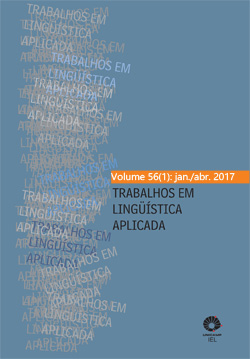Resumo
This essay explores the issue of oral production in English as a foreign language in Brazil. It reports the difficulty some students find to speak the language to matters of authority and legitimacy constituted in a particular history of language policies. Interest in the theme emerged because many Brazilian students who know English state they cannot speak the language and avoid pronouncing it and engaging in conversations. A discursive methodological framework forms the basis for the analysis of postings collected from discussion forums on different websites. First, I can´t speak English works as the reference statement that makes it possible to verify a discursive regularity in operation in Brazil. Second, a postcolonial theoretical framework supports the discussion on the conditions of possibility to speak English as a foreign language in a former Portuguese colony. The author argues that the ghost of the native, idealized speaker prevents students from recognizing the English they know as legitimate, and to speak it, and points out that dignity is a possible discourse to help deconstruct the colonial, silenced positioning that exists regarding the oral production in this foreign language.Referências
BHABHA, H. K. (2013) O local da cultura. Trad. Myrian Ávila, Eliana Lourenço de Lima Reis e Gláucia Renate Gonçalves. Belo Horizonte: Editora UFMG.
CHAUÍ, M. (2013) Manifestações ideológicas do autoritarismo brasileiro. Belo Horizonte: Autêntica; São Paulo: Editora Fundação Perseu Abramo. v. 2.
DABASHI, H. (2015) Can non-Europeans think? Chicago: University of Chicago Press and London: Zed Books.
DERRIDA, J. (1982) Margins of Philosophy, Chicago: University of Chicago Press.
DERRIDA, J. (2006) Specters of Marx: the state of debt, the work of mourning and the new International. New York: Routledge.
DERRIDA, J. (2012) Pensar em não ver: escritos sobre a arte do visível (1979-2004). Trad. Marcelo Jacques de Moraes. Florianópolis: Editora da Universidade Federal de Santa Catarina.
DERRIDA, J. (1982) The ear of the other: otobiography, transference, translation. Trad. Peggy Kamuf. Nova York: Schocken Books, 1988.
FOUCAULT, M. (1969) A arqueologia do saber. Trad. Luiz Felipe Baeta Neves. Rio de Janeiro: Forense Universitária, 1997.
FOUCAULT, M. (1977) Ditos e escritos. Estética: literatura e pintura, música e cinema. Trad. Inês Autran Dourado Barbosa. Rio de Janeiro: Forense Universitária, 2001. v. 3.
FREIRE, G. (1933) Casa-Grande e Senzala: Formação da família brasileira sob o regime patriarcal. São Paulo: Global, 2003.
HELSLOOT, N. e HAK, T. (2007). Pêcheux’s Contribution to Discourse Analysis. Forum Qualitative Sozialforschung / Forum: Qualitative Social Research, 8 (2), Art. 1. Available at: http://nbn-resolving.de/urn:nbn:de:0114-fqs070218. Acessed: 05 March 2015.
HOLLANDA, S. B. (1936) Raízes do Brasil. São Paulo: Companhia das Letras, 1995.
LEMKE, T. (2011) Critique and Experience in Foucault. Theory, Culture & Society. Vol. 28(4). pp. 26-48.
LIMA, D. C. (Ed.) (2011) Inglês em escolas públicas não funciona? Uma questão, múltiplos olhares. São Paulo: Parábola Editorial.
MAHBUBANI, K. (2001) Can Asians Think? Understanding the Divide between East and West. Toronto: Key Porter Books.
MIGNOLO, W. (2015) Yes, we can. In: H. Dabashi, Can non-Europeans think? Chicago: University of Chicago Press and London: Zed Books.
MIGNOLO, W. (2011) The darker side of Western modernity: Global futures, decolonial options. Durham and London: Duke University Press
PAYER, M. O. (2006) Memória da Língua: Imigração e Nacionalidade. São Paulo: Escuta.
PÊCHEUX, M. (1975) Semântica e discurso: uma crítica à afirmação do óbvio. Trad. Eni Puccinelli Orlandi, Lourenço Chacon Jurado Filho, Manoel Luiz Gonçalves Côrrea e Silvana Mabel Serrani. Campinas: Editora da Unicamp, 2009.
PÊCHEUX, M. (1983). O Discurso: estrutura ou acontecimento. Trad. Eni Puccinelli Orlandi. Campinas: Pontes, 2008.
PÊCHEUX, M. (1969) Análise automática do discurso. Trad. Bethania Sampaio Corrêa Mariani [et al.]. In: GADET, F.; HAK, T. (Eds.) Por uma análise automática do discurso: Uma introdução à obra de Michel Pêcheux. Campinas: Editora da Unicamp, 1990. pp. 61-161.
PESSOA, R. R.; PINTO, J. P. (2013) De resistências à aprendizagem da língua inglesa. Trabalhos em Linguística Aplicada. v. 52, n. 1, pp. 31-51.
REVUZ, C. (1998) A língua estrangeira entre o desejo de um outro lugar e o risco do exílio. In: Signorini, I. (Ed.), Língua(gem) e identidade: elementos para uma discussão no campo aplicado. Campinas: Mercado de Letras, pp. 213-230.
SAID, E. W. (1978) Orientalismo: O oriente como invenção do ocidente. Trad. Rosaura Eichenberg. São Paulo: Companhia das Letras, 2007.
SERRANI, S. M. (1997) A linguagem na pesquisa sociocultural: Um estudo da repetição na discursividade. Campinas: Editora da Unicamp.
SERRANI, S. M. (1998) Abordagem transdisciplinar da enunciação em segunda língua: a proposta AREDA. In: Signorini, I.; Cavalcanti, M. C. (Eds.), Linguística Aplicada e Transdisciplinaridade. Campinas: Mercado de Letras, pp. 127-150.
SPIVAK, G. C. (1999). A Critique of postcolonial reason: Toward a history of the vanishing present. Cambridge, Mass.: Harvard University Press.
SPIVAK, G. C. (1995) Can the subaltern speak? In: ASHCROFT, B.; GRIFFITHS, G.; TIFFIN, H. (Eds.) The post-colonial studies reader. Nova York: Routledge, 2006. pp. 28 -37.
SOUZA, J. (2015) A tolice da inteligência brasileira: Ou como o país se deixa manipular pela elite. São Paulo: Leya.
WANDERLEY, C. (2013) M. Condições de produção no espaço digital: horizonte de pesquisa. In: Hashiguti, S. T. (org.), Linguística Aplicada e Ensino de Línguas Estrangeiras: Práticas e Questões Sobre e Para a Formação Docente. Curitiba: CRV. pp. 125-136.
O periódico Trabalhos em Linguística Aplicada utiliza a licença do Creative Commons (CC), preservando assim, a integridade dos artigos em ambiente de acesso aberto, em que:
- A publicação se reserva o direito de efetuar, nos originais, alterações de ordem normativa, ortográfica e gramatical, com vistas a manter o padrão culto da língua, respeitando, porém, o estilo dos autores;
- Os originais não serão devolvidos aos autores;
- Os autores mantêm os direitos totais sobre seus trabalhos publicados na Trabalhos de Linguística Aplicada, ficando sua reimpressão total ou parcial, depósito ou republicação sujeita à indicação de primeira publicação na revista, por meio da licença CC-BY;
- Deve ser consignada a fonte de publicação original;
- As opiniões emitidas pelos autores dos artigos são de sua exclusiva responsabilidade.

